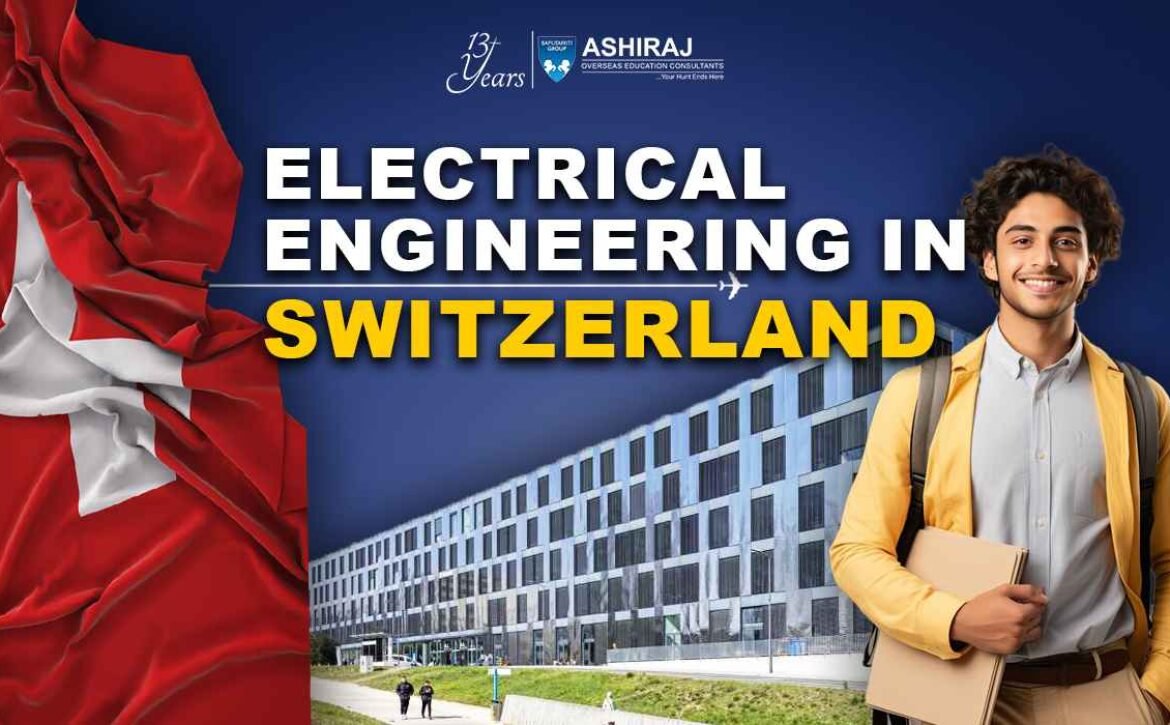
Electrical Engineering in Switzerland
Electrical Engineering in Switzerland offers a compelling blend of academic rigor and practical application, making it a sought-after field for aspiring engineers globally. Renowned for its precision engineering and innovation, Switzerland provides an ideal environment for students aiming to delve into advanced electrical technologies. Swiss universities emphasize a holistic approach to electrical engineering education, combining theoretical foundations with hands-on experience through cutting-edge research facilities and industry partnerships. Students benefit from exposure to emerging fields such as renewable energy systems, automation, and microelectronics, aligning their studies with the nation’s forward-looking industrial landscape.
Studying Electrical Engineering in Switzerland not only equips students with technical proficiency but also nurtures critical thinking and problem-solving skills essential for the industry’s demands. The curriculum emphasizes innovation and sustainability, reflecting Switzerland’s commitment to technological advancement and environmental stewardship. Graduates find themselves well-prepared for diverse career paths in sectors ranging from telecommunications and power systems to robotics and biomedical engineering, both within Switzerland and internationally. Thus, pursuing Electrical Engineering in Switzerland promises a transformative educational journey amidst one of Europe’s leading hubs for technological excellence.
Why to Study Electrical Engineering in Switzerland?
- Academic Excellence: Swiss universities are renowned for their high academic standards and cutting-edge research in electrical engineering.
- Innovative Environment: Switzerland fosters innovation with a strong emphasis on technological advancement and application in real-world settings.
- Industry Collaboration: Students benefit from partnerships with leading global companies, providing valuable internship and job opportunities.
- Multicultural Experience: Switzerland’s diverse student body and multicultural environment enrich the learning experience, preparing students for global careers.
- Advanced Facilities: State-of-the-art labs and research centers equipped with the latest technology support practical learning and experimentation.
- Focus on Sustainability: Programs often integrate sustainable engineering practices, aligning with Switzerland’s commitment to environmental stewardship.
- Career Prospects: Graduates are highly sought after by top employers worldwide, thanks to Switzerland’s reputation for producing skilled engineers.
- Quality of Life: Studying in Switzerland offers a high quality of life, with beautiful landscapes, safety, and a vibrant cultural scene.
- Networking Opportunities: Access to a strong alumni network and industry events enhances career prospects and professional growth.
- Global Recognition: A degree from a Swiss university in Electrical Engineering is globally recognized and respected, opening doors to international opportunities.
Top Universities to Study Electrical Engineering in Switzerland
Rank | University | QS World University Rankings 2023 | Type of University | Average Annual Fees | Programs Offered |
1 | ETH Zurich | 6 | Public | CHF 1,200 | Bachelor’s, Master’s, PhD in Electrical Engineering |
2 | EPFL (École Polytechnique Fédérale de Lausanne) | 14 | Public | CHF 1,500 | Bachelor’s, Master’s, PhD in Electrical Engineering |
3 | University of Zurich | 73 | Public | CHF 1,000 | Bachelor’s, Master’s in Electrical Engineering |
4 | University of Geneva | 122 | Public | CHF 900 | Bachelor’s in Electrical Engineering |
5 | University of Basel | 151-200 | Public | CHF 1,200 | Bachelor’s in Electrical Engineering |
Studying Electrical Engineering in Switzerland provides access to top-tier universities renowned for their academic excellence and research contributions. Here are the top 5 universities:
- ETH Zurich: Ranked 6th globally, ETH Zurich offers comprehensive programs in Electrical Engineering at undergraduate, graduate, and doctoral levels, with an annual fee of approximately CHF 1,200.
- EPFL (École Polytechnique Fédérale de Lausanne): Ranked 14th worldwide, EPFL provides extensive opportunities in Electrical Engineering, including Bachelor’s, Master’s, and PhD programs, with an annual fee of about CHF 1,500.
- University of Zurich: Ranked 73rd globally, UZH offers Bachelor’s and Master’s degrees in Electrical Engineering, emphasizing research and practical skills development, with an average annual fee of CHF 1,000.
- University of Geneva: Ranked 122nd globally, UNIGE provides a Bachelor’s program in Electrical Engineering, focusing on foundational principles and specialized coursework, with an annual fee of approximately CHF 900.
- University of Basel: Ranked between 151-200 globally, Uni Basel offers a Bachelor’s program in Electrical Engineering, integrating theoretical knowledge with practical applications, with an annual fee of CHF 1,200.
Course Curriculum for Electrical Engineering in Switzerland
- Core Subjects: Emphasis on foundational courses such as Circuit Theory, Electronics, Electromagnetics, and Digital Signal Processing forms the backbone of the curriculum.
- Specialization Options: Opportunities to specialize in areas like Power Systems, Control Systems, Communication Engineering, and Microelectronics allow students to tailor their education based on their interests and career goals.
- Laboratory Work: Extensive hands-on experience in state-of-the-art labs enhances practical skills in designing, analyzing, and troubleshooting electrical systems and components.
- Project-Based Learning: Integration of project-based courses where students apply their knowledge to real-world problems, fostering innovation and teamwork.
- Industry Collaboration: Collaboration with industry partners through internships, projects, and guest lectures provides insight into current industry practices and challenges.
- Research Opportunities: Access to cutting-edge research facilities encourages students to engage in research initiatives, contributing to advancements in the field.
- Ethics and Sustainability: Courses addressing ethical considerations and sustainable practices in electrical engineering prepare students to be responsible professionals.
- Capstone Projects: Culmination of the program often involves a capstone project or thesis, allowing students to demonstrate their mastery of skills and knowledge in a specific area of interest.
Eligibility Criteria & Admission Requirements for MS in Electrical Engineering in Switzerland
- Academic Qualifications: Typically, applicants need a recognized secondary school certificate or equivalent with strong grades in mathematics, physics, and sometimes chemistry.
- Language Proficiency: Demonstrated proficiency in English or German is required. Accepted language test scores are:
Test | Minimum Score |
IELTS | Overall 6.5 |
TOEFL | 90 (iBT) |
- Standardized Tests: Depending on the university, applicants may need to submit scores for:
Test | Minimum Score |
GRE | Quantitative: 160, Verbal: 150 |
GMAT | Quantitative: 650, Verbal: 550 |
- Passport & Student Visa: A valid passport and appropriate student visa are required for international students intending to study in Switzerland.
- Academic Certificates: Official transcripts and certificates from previous academic institutions demonstrating completion of required courses and grades.
- Work Experience: Some programs may prefer or require applicants to have relevant work experience in electrical engineering or related fields, particularly for postgraduate studies.
Meeting these criteria ensures that prospective students are academically prepared and meet the language and proficiency standards necessary for success in Electrical Engineering programs in Switzerland.
Documents Required for Studying Electrical Engineering in Switzerland
- Passport: Valid passport ensuring identity and nationality verification.
- Letters of Recommendation (LOR): Typically two letters from professors or employers endorsing the applicant’s academic capabilities and personal qualities.
- Statement of Purpose (SOP): A personal statement outlining academic interests, career goals, and reasons for choosing the specific program.
- Curriculum Vitae (CV): A detailed resume highlighting academic achievements, work experience, skills, and extracurricular activities.
- Official High School Transcripts and Certificates: Records of secondary education including grades and certificates demonstrating completion of required coursework.
- Work Experience Certificate: If applicable, proof of relevant work experience in electrical engineering or related fields.
- Proof of Financial Resources: Documentation demonstrating the ability to cover tuition fees, living expenses, and other costs while studying in Switzerland.
These documents play a crucial role in the admissions process, providing universities with a comprehensive profile of each applicant’s qualifications, achievements, and readiness for studying Electrical Engineering in Switzerland.
Admission Process for Electrical Engineering in Switzerland
- Application Submission: Complete the online application form provided by the chosen university, ensuring all sections are accurately filled out.
- Document Submission: Gather and submit required documents including academic transcripts, language proficiency test scores (IELTS or TOEFL), standardized test scores (GRE or GMAT), passport copy, LORs, SOP, CV, and proof of financial resources.
- Application Review: The university admissions committee reviews all submitted applications and documents to assess eligibility and suitability for the program.
- Interview (if required): Some universities may conduct interviews to further evaluate candidates’ academic preparedness, motivations, and potential contributions to the program.
- Admission Decision: Upon review, the university notifies applicants of their admission status. Accepted students receive an offer letter or admission confirmation.
- Acceptance and Confirmation: Accepted students must confirm their acceptance of the offer by the specified deadline, often accompanied by payment of any required fees.
- Visa Application: International students must apply for a student visa to study in Switzerland, providing the necessary documents, including the university’s acceptance letter.
- Orientation: Upon arrival, students attend orientation sessions to familiarize themselves with the university, campus facilities, academic policies, and student services.
Following these steps ensures a smooth and systematic admission process for aspiring Electrical Engineering students aiming to study in Switzerland.
“Education is the most powerful weapon which you can use to change the world.”
Nelson Mandela
Cost of Electrical Engineering Course in Switzerland
- Tuition Fees: Annual tuition fees vary between universities, typically ranging from CHF 1,000 to CHF 1,500 for international students at public universities.
- Living Expenses: Switzerland has a high cost of living, including accommodation, food, transportation, and personal expenses, estimated at approximately CHF 18,000 to CHF 25,000 per year.
- Additional Costs: Additional expenses may include health insurance, study materials, and social activities, adding to the overall cost of living and studying in Switzerland.
- Scholarship Opportunities: Scholarships and grants may be available to help offset tuition fees and living costs for eligible students, depending on academic merit or financial need.
- Part-Time Work: International students are permitted to work part-time during their studies to supplement living expenses, with regulations permitting up to 15-20 hours per week.
- Financial Planning: Detailed financial planning is essential to ensure sufficient funds are available to cover all expenses throughout the program.
Understanding and budgeting for these costs is crucial for prospective students considering Electrical Engineering in Switzerland, ensuring they can effectively manage their finances and enjoy a fulfilling academic experience in a vibrant European setting.
Scholarships for Electrical Engineering Courses in Switzerland
Scholarship Name | Amount | Application Deadline |
ETH Zurich Excellence Masters Scholarships | CHF 15,000-30,000 per year | December 15th (annual) |
EPFL Excellence Fellowships | CHF 16,000-32,000 per year | January 15th (annual) |
University of Zurich Scholarships | CHF 10,000-25,000 per year | Varies, check university website |
Swiss Government Excellence Scholarships | Full tuition, stipend, insurance | September (annual) |
ETH Zurich Foundation Scholarships | CHF 15,000-30,000 per year | May 31st (annual) |
These scholarships provide financial support to international and domestic students pursuing Electrical Engineering degrees in Switzerland. They typically cover tuition fees and living expenses, enabling students to focus on their studies and research. Applicants should adhere to specific deadlines and meet eligibility criteria, including academic excellence and financial need, to maximize their chances of securing funding for their education.
Career Opportunities After Electrical Engineering in Switzerland
Job Profile | Average Salary (CHF/year) |
Electrical Engineer | 80,000 – 120,000 |
Electronics Engineer | 75,000 – 110,000 |
Control Systems Engineer | 85,000 – 130,000 |
Power Systems Engineer | 90,000 – 140,000 |
Telecommunications Engineer | 80,000 – 120,000 |
Graduates of Electrical Engineering in Switzerland can pursue diverse career paths in sectors such as electronics, telecommunications, power systems, and more. These roles involve designing, implementing, and maintaining electrical systems and equipment, ensuring efficient and reliable operation. Salaries vary based on experience, specialization, and employer, with opportunities for career advancement and professional development in Switzerland’s thriving engineering sector. Prospective graduates are encouraged to leverage their academic qualifications and practical skills gained during their studies to secure rewarding positions that align with their career aspirations in Electrical Engineering.
Frequently Asked Questions About Electrical Engineering in Switzerland
ETH Zurich, EPFL (École Polytechnique Fédérale de Lausanne), University of Zurich, University of Geneva, and University of Basel are highly ranked for Electrical Engineering.
Admission typically requires a secondary school certificate, language proficiency (IELTS/TOEFL), standardized test scores (GRE/GMAT), and relevant documents like LORs, SOP, CV, and transcripts.
Yes, universities like ETH Zurich and EPFL offer scholarships based on academic merit and financial need. Application deadlines and eligibility criteria vary.
Tuition fees range from CHF 1,000 to CHF 1,500 per year at public universities. Living expenses add approximately CHF 18,000 to CHF 25,000 annually.
Graduates can pursue careers as Electrical Engineers, Electronics Engineers, Control Systems Engineers, and more, with average salaries ranging from CHF 75,000 to CHF 140,000 per year.
Yes, international students can work up to 15-20 hours per week during term time and full-time during holidays with the appropriate permit.
A Bachelor’s degree typically takes 3-4 years, and a Master’s degree takes an additional 1-2 years, depending on the university and program structure.
Most programs are taught in English or German. Applicants must demonstrate proficiency through tests like IELTS (6.5 overall) or TOEFL (90 iBT).
Swiss universities offer extensive research opportunities in areas like power systems, telecommunications, microelectronics, and renewable energy systems.
Admission is competitive, with universities seeking candidates with strong academic backgrounds, relevant experience, and a clear motivation for studying Electrical Engineering.




